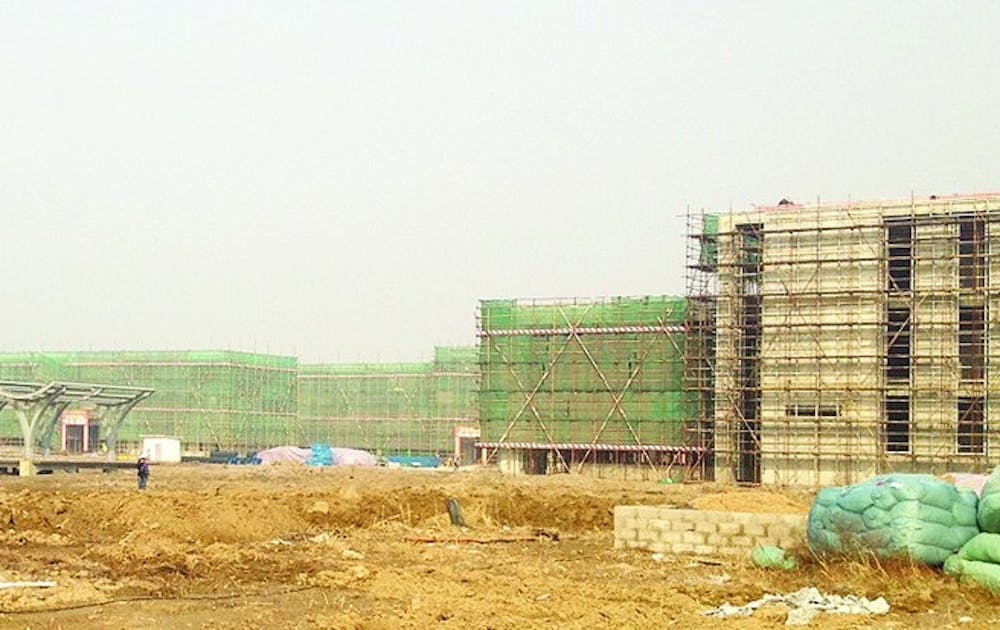Planning for student life at Duke Kunshan University is now underway, amidst uncertainties about what shape the campus will take.
As academic planning for the new China campus continues, working groups have begun to develop ideas for what student life will be like in Kunshan. But those involved with the planning foresee multiple challenges, including how to bridge cultural gaps, address academic freedom and plan for a small but diverse student population. Additionally, DKU’s construction completion date has fluctuated since the campus first began to take shape, so administrators are only able to work toward a tentative target date between late 2013 and early 2014.
Duke has much to learn from Chinese university administrators, said Vice President for Student Affairs Larry Moneta, who recently returned from a trip to China where he spoke with student affairs officials at Wuhan University—Duke’s Chinese legal partner—and visited the DKU campus. Moneta is working with Li-Chen Chin, director of the International House, among others, to address everything from dining and housing to health care. Student affairs will be under the purview of DKU Executive Vice Chancellor Mary Bullock, who will take on her position full time in January.
Moneta cited health care at DKU as a primary example of something that will be difficult to tackle because it is so different from the American model. He added that the student affairs working group is planning to enter talks with several possible health care providers in China to create a health center and to ensure access to emergency and ongoing care facilities.
The Kunshan Student Advisory Council, comprised of 10 undergraduate and 10 graduate students, has been brainstorming ideas for what students might want on the Kunshan campus. In their planning, they are trying to bridge the gap between what Chinese students and American students are looking for, said Junyang Wang, Trinity ’11 and student liaison at the Office of Global Strategy and Programs. At the moment, administrators are anticipating that the student population will be half Chinese and half American or other international students.
“There’s no other campus like this,” Wang, who is also a first-year Duke Global Health Institute graduate student said. “We don’t have anything to model off of, and it could very well change.”
Nora Bynum, vice provost for DKU and China initiatives, noted that initially it might be hard to build a community because students will only stay on the campus for short periods of time, and they will all be part of small, individual programs.
Some of the ideas that have come up so far include 24-hour dining, sports facilities and shuttles to and from cities around Kunshan, Wang said. He added that subcommittees—looking at topics such as extracurriculars, student services and diversity—will present specific ideas to the whole group Thursday.
Students are particularly interested in developing an academic honor code because standards of academic integrity are not black and white in China, he noted.
Moneta said he was previously led to believe that DKU was in a somewhat remote location. But after visiting, he realized that it is in a quickly growing area with easy access to downtown Kunshan and nearby cities via high-speed rail.
“I came back kind of excited about how relatively nearby opportunities are both on and off campus,” he said. “There is a lot more interesting life than I expected.”
Physically, the campus appears to be taking shape, Moneta said. He added that the campus was abuzz with workers.
At the September Academic Council meeting, Provost Peter Lange noted that there was a temporary lull in construction due to a “dispute” this Spring. He did not elaborate on the nature of the dispute but at the time said Kunshan was confident that the campus facilities would be complete enough to host students and visitors July 2013.
Since Duke received preparation approval from the Chinese Ministry of Education—the first step in the approval process—in August, the campus has received much attention in China. Bynum said the city of Kunshan is now “highly motivated” to finish building the campus as soon as possible. The city government is funding the campus’ construction—which was previously estimated to be worth $260 million.
“One of the things that we’re hoping will accelerate [the construction] is that it’s become a very public project,” she said.
Duke is currently in the process of submitting its application for final establishment approval from the Chinese Ministry of Education, which they need in order to offer degree programs through DKU. Because DKU has not received establishment approval, Duke is not allowed to formally recruit and enroll students to earn a DKU degree.
Throughout the Fall, administrators have said there will likely be non-degree programming taking place at the campus before the university is approved for degree-seeking students, but plans will not be formalized until construction is closer to completion. As soon as the conference center, classrooms and residence halls are finished, Duke will start to offer programs—ranging from undergraduate study abroad and DukeEngage to research opportunities and conferences, Bynum said.
“We’ll try to work in as much programming as we can,” Bynum said. “As soon as we can do it, we will do it.”
Any programs at the Kunshan campus before final approval will be offered jointly through Duke and Wuhan—not DKU, because the university will not yet be an independent entity, said Haiyan Gao, chair of the China Faculty Council and the Henry Newson professor of physics.
Duke faculty have already approved a Master of Management Studies degree through the Fuqua School of Business as well as a Master of Science and an undergraduate study abroad program through DGHI. Faculty have only been formally recruited so far for the DGHI-sponsored programs. The China Faculty Council is currently reviewing about 15 proposals for potential research projects in China, some of which could be based in Kunshan.
Get The Chronicle straight to your inbox
Signup for our weekly newsletter. Cancel at any time.

